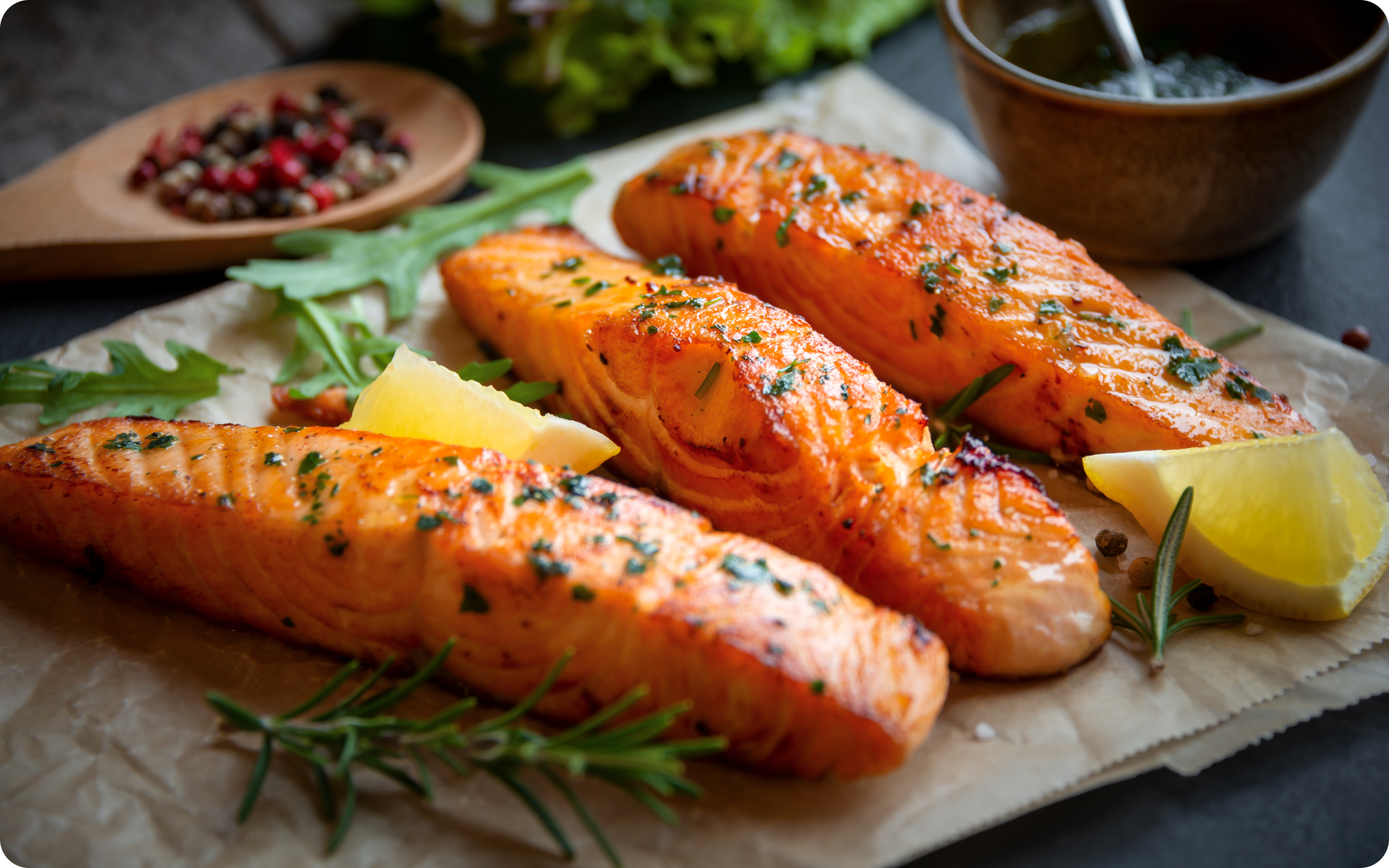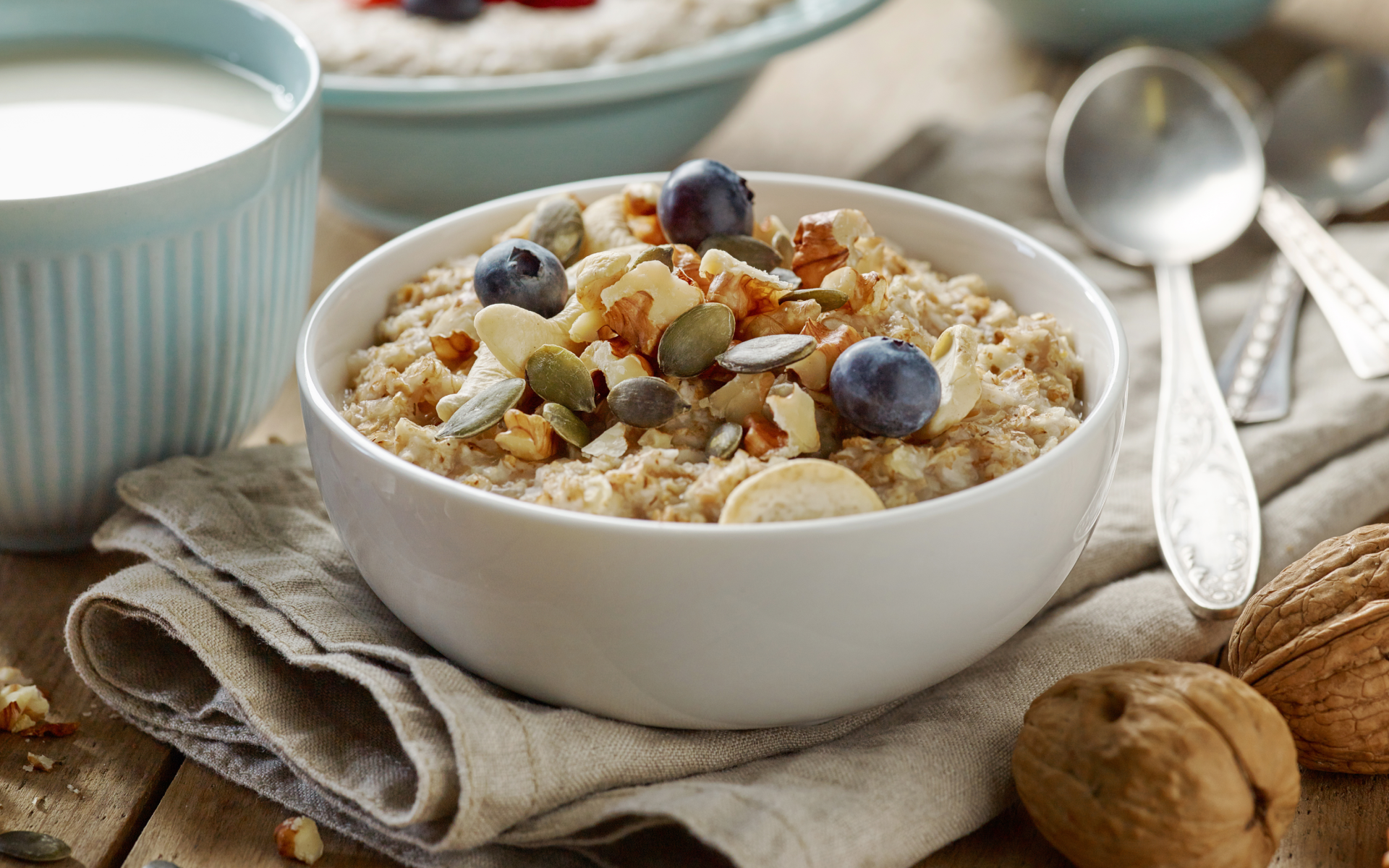Unless you’re living under a rock, you’ve probably heard of the keto diet by now. The low-carb, high-fat eating plan has become one of the hottest diet trends in recent years, and it doesn’t seem to be going anywhere anytime soon.
Research has suggested that the keto diet can lead to weight loss, improved blood sugar control, and other health benefits (20). It appears safe for most healthy adults to try, but there are a few things you should keep in mind before you jump on the bandwagon.
If you’re thinking about starting the keto diet, it’s important to be prepared and create a plan that works for you. This simple 1-week keto meal plan is a good starting point. It includes all the basic keto staples, in addition to some higher-carb options for those who want to add more variety to their diet.
But first, let’s review the basics of the keto diet and help you see why it could be a good fit for you.
What Is the Keto Diet All About?
The keto diet is a low-carb, high-fat diet that encourages the body to burn fat for energy instead of glucose. On a ketogenic diet, your carb intake is typically limited to 5-10% of your total calories. This means that if you eat 2,000 calories per day, you can only have 20-50 grams of carbs (13).
The rest of your calories will come from fat (55-86%) and protein (30-35%). While it’s important to eat enough protein to support your muscles, too much can kick you out of ketosis. This is why most people on a keto diet stick to moderate amounts of protein-rich foods such as meat, fish, and low-carb vegetables.
When you cut carbs and eat more fat, your body enters a state called ketosis. In this metabolic state, your liver starts to break down fat into ketones which your body then uses for energy (13).
Ketosis can be a helpful tool for weight loss, diabetes control, and other health conditions (6).
It’s important to note that the keto diet is not for everyone. Some people may experience side effects such as headaches, constipation, or nausea. It’s also not the only diet that can work for weight loss and other health benefits. As with any diet, it’s always important to talk to your doctor before you make any major changes to your eating habits.
Reasons why BetterMe is a safe bet: a wide range of calorie-blasting workouts, finger-licking recipes, 24/7 support, challenges that’ll keep you on your best game, and that just scratches the surface! Start using our app and watch the magic happen.
Benefits of the Keto Diet
Like many popular diets, proponents of the keto diet claim that it has several potential benefits.
Weight Loss
One of the biggest potential benefits of the keto diet is sustained weight loss (18). A ketogenic diet can help you lose fat, including the dangerous visceral fat that builds up around your organs and increases your risk of heart disease and diabetes (7).
One of the ways it does this is by restricting carbs, which means you eat fewer calories overall. When your body doesn’t get a steady supply of carbs, it turns to stored fat for energy. Eating less leads to a calorie deficit and ultimately, weight loss.
Improved Blood Sugar Control
The keto diet can also help improve blood sugar control for people with diabetes or prediabetes. In people with type 2 diabetes, the keto diet has been shown to help reduce A1C levels at least as well as other diets (15).
This is significant because A1C is a measure of long-term blood sugar control. A lower A1C level means your diabetes is under better control (2). However, a keto diet is not appropriate for everyone, and if you have diabetes, should only be done under medical supervision because of the risk of hypoglycemia (dangerously low blood sugar).
Improved Cognitive Function
Limited evidence suggests that the keto diet can improve cognitive function, particularly in those with Alzheimer’s disease. One review found the keto diet to be associated with improved cognitive performance in elderly people with Alzheimer’s (10).
Reduced Risk of Heart Disease
The keto diet may also help reduce your risk of heart disease. One review found the keto diet may be associated with improvements in some cardiovascular risk factors, including obesity, type 2 diabetes, and HDL cholesterol (9). However, the authors noted that these effects are usually limited. It’s possible that the weight loss leads to metabolic benefits, particularly in overweight or obese people, rather than the particular diet itself.
May Help Reduce Cancer Risk
One of the more recently proposed benefits of the keto diet is that it may help reduce the risk of cancer. Some studies in animals have suggested that the keto diet may help slow the growth of cancer cells (12) (21).
While more research is required, the keto diet may one day be used as an adjunct to cancer treatment.
Lower Inflammation
Inflammation is your body’s natural response to injury or infection. While it’s important to have an acute inflammatory response, chronic inflammation can lead to health problems such as heart disease, arthritis, and diabetes (17).
Some evidence has suggested that the keto diet can help reduce inflammation throughout the body, which may help protect against some of these diseases (20). However, results are inconsistent.
The impact of a keto diet on inflammation may be influenced by an individual keto dieter’s fiber intake and the quality of their fat intake (3).
Side Effects of the Keto Diet
The keto diet is generally safe for most healthy adults, but there are a few potential side effects you should be aware of. Some side effects are typically mild and go away on their own, while other more serious risks are worth discussing with your healthcare provider:
Headaches
A common side effect of the keto diet is headaches. This is usually due to dehydration, which can be alleviated by drinking plenty of water and getting enough electrolytes through food (1).
Dizziness
Another common side effect is dizziness. This is usually due to low blood sugar and can be alleviated by eating more carbs or taking a sugar supplement.
Nausea
Nausea is another common side effect, particularly at the start of the diet (1). This is usually due to your body adjusting to the new diet and may be alleviated by drinking plenty of water and eating small, frequent meals.
Fatigue
Fatigue is a common side effect, particularly at the beginning of the diet. This is usually due to your body adjusting to the lessened carbohydrate intake (11). In such cases, you should take it easy for a few days until you have more energy.
Constipation
Constipation is a common side effect of the keto diet, particularly if you’re not eating enough fiber (1). This can be alleviated by eating more fiber-rich foods and/or taking a fiber supplement.
Kidney Stress
A high intake of animal foods on the keto diet may increase the risk of kidney stones. In addition, if you have a kidney disease or are at risk of developing it, you should not follow the keto diet.
Chronic Disease Risk
Although some evidence has suggested that the keto diet can improve certain risk factors for chronic diseases such as heart disease, this is controversial. In the short term, these metabolic benefits may be more due to weight loss than anything special about the diet. In the long term, a keto diet that is high in animal products may actually increase the risk for heart disease and certain cancers. If you have heart disease or are at risk of developing it, you should not follow the keto diet.
Read more: Is Pho Keto? The Ultimate Guide to Enjoying Pho on a Low-Carb Diet
How Much Weight Can I Lose on Keto For 1 Week?
There are several factors that determine the amount of weight an individual can lose on the ketogenic diet. According to some research on the diet, people have reported losses ranging from 1 pound (0.5 kg) to 10 pounds (5 kg) or more in the initial week (23). Key considerations for this would include:
- Initial Weight and Body Composition: The starting weight and body composition of the individual play a significant role in the weight loss that is observed at the start of the keto diet. Those with higher initial weights may experience more substantial initial losses, which is often attributed to water weight reduction.
- Caloric Deficit: Another key aspect to consider is the number of calories you’re consuming. Weight loss fundamentally depends on creating a caloric deficit. The keto diet’s primary mechanism is shifting the body into ketosis, and utilizing fat for energy. A caloric deficit, which is achieved through reduced carb and overall calorie intake, contributes to weight loss.
- Water Weight Loss: During the initial phase of keto, the body uses up the glycogen that is stored in the liver and muscles and releases water. As a result, you may notice rapid weight loss in the first week, but this is primarily water weight and not fat loss.
- Individual Metabolism: Metabolic rates vary between individuals, thereby impacting the rate of weight loss. While some may experience faster results due to a higher metabolic rate, others may need to work for longer periods to observe the same results.
- Strict Adherence: Whether you’re sincerely dedicated to the keto diet or you’re taking it casually will influence outcomes. Those who are following the guidelines closely may see more consistent and noticeable results.
- Physical Activity: Incorporating physical activity can also enhance the effectiveness of the diet. Exercise contributes to a greater caloric deficit, and in turn, promotes weight loss.
While it’s common to see a notable drop in the first week on keto, individual factors significantly influence the amount of weight lost. Sustainable, long-term weight loss is more dependent on the continued creation of a calorie deficit and overall lifestyle factors.
How to Start the Keto Diet
If you’re interested in trying the keto diet, there are several things you need to know. First, it’s important to do your research and talk to your healthcare provider before you make any major changes to your diet.
Second, you’ll need to start by lowering your carb intake. Most people on the keto diet start by reducing their carb intake to 20-50 grams per day. This may be a bit difficult for some people, but it’s doable with a little planning.
Third, you’ll need to increase your fat intake. Many people on the keto diet aim for a 70/25/5 ratio of fat/protein/carbs. This means that 70% of your calories should come from fat, 25% from protein, and 5% from carbs.
Fourth, you’ll need to make sure you’re getting enough electrolytes. When you reduce your carb intake, you’ll also lose a lot of water weight. This can lead to dehydration if you’re not careful. To avoid this, make sure you drink plenty of water and eat foods that are rich in electrolytes such as sodium and potassium.
Finally, it’s important to be patient. It may take a while for your body to adapt to the keto diet. You should give yourself at least two to four weeks before you judge the diet’s effectiveness.
Keto diet 1-week meal plan
If you’re thinking about trying the keto diet or are already practicing it and looking for some new recipes and meal ideas, this 1-in addition to a shopping list and tips for following the keto diet.
Day 1
- Breakfast: 2 eggs cooked in olive oil with bacon or sausage
- Lunch: Tuna salad with mayo, hard-boiled eggs, and cucumber
- Dinner: Chicken thighs cooked in olive oil with broccoli and cheese
- Snacks: Almonds, cheddar cheese sticks, or celery with peanut butter
Day 2
- Breakfast: Keto pancakes made with almond flour, eggs, and butter
- Lunch: BLT salad with romaine, bacon, tomatoes, and avocado
- Dinner: Grilled steak with sautéed mushrooms and onions
- Snacks: Baby carrots, pepperoni sticks, or peanut butter cups
Day 3
- Breakfast: Bacon and eggs
- Lunch: Turkey club sandwich with bacon, lettuce, tomato, and mayo on keto bread
- Dinner: Salmon with asparagus and hollandaise sauce
- Snacks: Parmesan cheese crisps, deli meat roll-ups, or deviled eggs
Day 4
- Breakfast: Ham and cheese omelet
- Lunch: Cobb salad with chicken, bacon, avocado, and blue cheese
- Dinner: Pork chops with green beans and mashed cauliflower
- Snacks: Cucumber slices with ranch dressing, nuts, or berries
Day 5
- Breakfast: Breakfast sausage with eggs
- Lunch: Grilled chicken Caesar salad
- Dinner: Beef roast with carrots and celery
- Snacks: String cheese, olives, or keto muffins
Day 6
- Breakfast: Omelet with vegetables
- Lunch: Chicken salad with mayo and grapes
- Dinner: Pork tenderloin with roasted Brussels sprouts and sweet potatoes
- Snacks: Cottage cheese, celery with peanut butter, or keto bars
Day 7
- Breakfast: 3-ingredient keto pancakes
- Lunch: Shrimp salad with avocado and cucumber
- Dinner: Chicken stir-fry with broccoli and cashews
- Snacks: Parmesan cheese crisps, deli meat roll-ups, or hard-boiled eggs
BetterMe app will provide you with a host of fat-frying fitness routines that’ll scare the extra pounds away and turn your body into a masterpiece! Get your life moving in the right direction with BetterMe!
Shopping List for the 1-Week Keto Meal Plan
Here’s a shopping list of the items you’ll need for this 1-week keto meal plan:
- Bacon
- Sausage
- Tuna
- Mayo
- Eggs
- Romaine lettuce
- Broccoli
- Cheese
- Almonds
- Cheddar cheese
- Celery
- Peanut butter
- Olive oil
- Salmon
- Asparagus
- Hollandaise sauce
- Pork chops
- Green beans
- Mashed cauliflower
- Keto bread, pancake mix, and bars
- Berries
- Parmesan cheese
- Pepperoni sticks
- Baby carrots
- String cheese
Tips for Success While Following the 1-Week Keto Clean Meal Plan
Here are a few tips that will help you be successful when you follow this keto meal plan:
Meal Prep
Meal prepping is the key to any successful diet. It helps to have healthy meals already prepared and ready to eat when you’re feeling hungry. This will help prevent you from making unhealthy choices or binge eating (16).
To prep for this 1-week keto meal plan, cook the chicken, salmon, and steak at the start of the week. Store them in the fridge to eat for lunch or dinner throughout the week. Hard-boil a dozen eggs to have on hand for snacks or to add to salads.
Cook Once, Eat Twice
Whenever you can, cook extra of each recipe so you can have leftovers for another meal. For example, cook a double batch of chicken thighs and broccoli so you can have it for lunch the next day. This will save you both time and money.
Scale Recipes Up or Down
If you’re cooking for one, most recipes can be scaled down. Simply reduce the ingredients accordingly. If you’re cooking for a larger crowd, many of these recipes can also be easily doubled or tripled.
Learn to Read Labels
One of the most important skills to have when following a keto diet is knowing how to read food labels. Make sure you look for hidden sources of carbs, such as maltodextrin or dextrose. These are often added to food products to enhance flavor or texture and can soon add up.
Be Flexible
The best part about following a keto diet is that it’s an incredibly flexible way of eating. You can switch up the recipes and meals as you see fit. For example, if you’re not a fan of salmon, try switching it out for another type of fish or even chicken or steak. Don’t be afraid to get creative in the kitchen.
Fight the Keto-Flu Through Diet
When you start a keto diet, it’s important to drink plenty of water and electrolytes to help fight the keto flu. You can do this by drinking bone broth, sports drinks, or adding salt to your food. You can also eat foods that are high in potassium and magnesium, such as avocados, nuts, and leafy greens.
Don’t Give Up!
If you find yourself struggling to stick to this meal plan, don’t give up! It takes time to adjust to a new way of eating and you may not see results right away. Just keep at it and you’ll eventually get the hang of it.
Read more: 6 Keto Sushi Recipes to Eat on a Low-Carb Diet
FAQs
How do I know I’m in ketosis?
There are several ways of knowing whether your body is going into the ketosis state, including (24):
- Keto Breath and Metallic Taste: Elevated ketone levels can lead to distinctive keto breath, which is often described as fruity or having an acetone-like odor. Alternatively, some individuals experience a metallic taste in their mouth.
- Ketone Measurements: Utilizing tools such as ketone strips or breath analyzers provides a quantitative measure of ketone levels. Higher ketone concentrations in your breath or urine serve as tangible indicators of the body’s successful transition into ketosis.
- Reduced Hunger and Enhanced Focus: Many people report a reduction in hunger and improved cognitive function, which can serve as subjective indicators of being in a ketogenic state.
Increased Thirst and Urination: As the initial stages of ketosis involve the release of stored glycogen, which leads to water loss, it’s natural that you experience a subsequent increased thirst and frequent urination. Make sure you drink plenty of water to avoid dehydration. If you experience extreme thirst or dark-colored urine, you should consult your healthcare provider.
How can I speed up my ketosis?
If you’re looking to speed up the results of your keto diet, here are a few tips and tricks to remember to possibly expedite ketosis (22):
- Strict Carbohydrate Restriction: Limiting your daily carb intake to 20-50 grams is a fundamental step in inducing and maintaining ketosis.
- Incorporate Healthy Fats: Consuming healthy fats, such as those that are found in avocados, olive oil, and nuts, provides the necessary energy source for sustaining ketosis.
- Try Intermittent Fasting: Keto vs intermittent fasting may be a hotly debated topic, but it’s important to know that the latter can expedite the onset of ketosis when coupled with the keto diet, thereby promoting more efficient fat utilization for energy.
- Regular Exercise: Engaging in physical activity accelerates glycogen depletion, and helps with the prompt transition into ketosis.
Is it normal to lose 7 pounds in a week on keto?
In most cases, a person can lose approximately 1 pound (0.5 kg) to 10 or more pounds (5 kg) in the first week of keto. This is dependent on the following factors:
- Water Weight Loss: The initial weight drop often involves shedding water weight due to reduced glycogen stores, and should not be mistaken for actual fat loss.
- Individual Variation: Weight loss varies significantly based on factors such as metabolism, starting weight, and adherence to the keto diet.
It is also important to note the distinction between short-term weight loss and a sustainable long-term plan when starting on the keto diet.
Sustainable vs. Initial Drop: While a rapid initial loss is not uncommon, it’s important to distinguish between initial water weight loss and sustained fat loss. Sustainable weight loss typically ranges from 1-2 pounds per week.
What foods should I avoid on a keto diet plan?
To ensure better results on the keto diet, the following foods should be avoided at all costs:
- High-Carb Foods: Eliminate grains, starchy vegetables, and sugary fruits from your diet plan as they can hinder the process of ketosis.
- Ultra-Processed Foods: Another hack is to stay away from ultra-processed items that contain added sugars and unhealthy fats to maintain the integrity of your diet.
- Sugary Snacks: It’s essential to steer clear of candies, pastries, and other high-sugar snacks that can disrupt the onset of ketosis.
Alternatively, go for snacks with no carbs, such as nuts, seeds, or cheese, to satisfy cravings while remaining within the carbohydrate limits of the keto diet.
The Bottom Line
The 1-week keto meal plan is designed to help you transition into a keto diet and start seeing results. It’s a great way to jumpstart your weight loss journey or break through a weight loss plateau. Just remember to be flexible, stick to healthy foods, and stay hydrated.
DISCLAIMER:
This article is intended for general informational purposes only and does not serve to address individual circumstances. It is not a substitute for professional advice or help and should not be relied on for making any kind of decision-making. Any action taken as a direct or indirect result of the information in this article is entirely at your own risk and is your sole responsibility.
BetterMe, its content staff, and its medical advisors accept no responsibility for inaccuracies, errors, misstatements, inconsistencies, or omissions and specifically disclaim any liability, loss or risk, personal, professional or otherwise, which may be incurred as a consequence, directly or indirectly, of the use and/or application of any content.
You should always seek the advice of your physician or other qualified health provider with any questions you may have regarding a medical condition or your specific situation. Never disregard professional medical advice or delay seeking it because of BetterMe content. If you suspect or think you may have a medical emergency, call your doctor.
SOURCES
- Advantages and Disadvantages of the Ketogenic Diet: A Review Article (2020, ncbi.nlm.nih.gov)
- All About Your A1C (2021, cdc.gov)
- Anti-Inflammatory Properties of Diet: Role in Healthy Aging (2021, mdpi.com)
- Are low-carbohydrate diets safe in chronic or diabetic kidney disease? (2019, ncbi.nlm.nih.gov)
- Beneficial and Detrimental Effects of Reactive Oxygen Species on Lifespan: A Comprehensive Review of Comparative and Experimental Studies (2021, frontiersin.org)
- Beyond weight loss: a review of the therapeutic uses of very-low-carbohydrate (ketogenic) diets (2013, nature.com)
- Body Fat Distribution and Risk of Cardiovascular Disease | Circulation (2012, ahajournals.org)
- Can Ketogenic Diet Improve Alzheimer’s Disease? Association With Anxiety, Depression, and Glutamate System (2021, frontiersin.org)
- Effects of Ketogenic Diets on Cardiovascular Risk Factors: Evidence from Animal and Human Studies (2017, mdpi.com)
- Ketogenic Diet in Alzheimer’s Disease (2019, mdpi.com)
- Ketogenic diets: Boon or bane? (2018, ncbi.nlm.nih.gov)
- Ketogenic diets as an adjuvant cancer therapy: History and potential mechanism (2014, sciencedirect.com)
- Ketogenic Diet – StatPearls – NCBI Bookshelf (2021, ncbi.nlm.nih.gov)
- Long-Term Ketogenic Diet Induces Metabolic Acidosis, Anemia, and Oxidative Stress in Healthy Wistar Rats (2020, hindawi.com)
- Low-Carb and Ketogenic Diets in Type 1 and Type 2 Diabetes (2019, mdpi.com)
- Meal planning is associated with food variety, diet quality and body weight status in a large sample of French adults (2017, biomedcentral.com)
- Pathology, Inflammation (2021, ncbi.nlm.nih.gov)
- Recent advances in the application of a ketogenic diet for obesity management (2021, sciencedirect.com)
- The Current Status of the Ketogenic Diet in Psychiatry (2017, frontiersin.org)
- The Potential Health Benefits of the Ketogenic Diet: A Narrative Review (2021, mdpi.com)
- The Pros and Cons of Low Carbohydrate and Ketogenic Diets in the Prevention and Treatment of Cancer (2021, frontiersin.org)
- Tips to get into Ketosis ( 2023, healthline.com)
- What can you expect after 1 week on Keto? (2023, healthline.com)
- What are the symptoms of ketosis? We look at 10 signs (2023, healthline.com)











